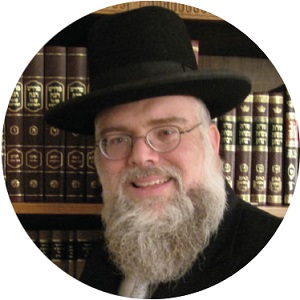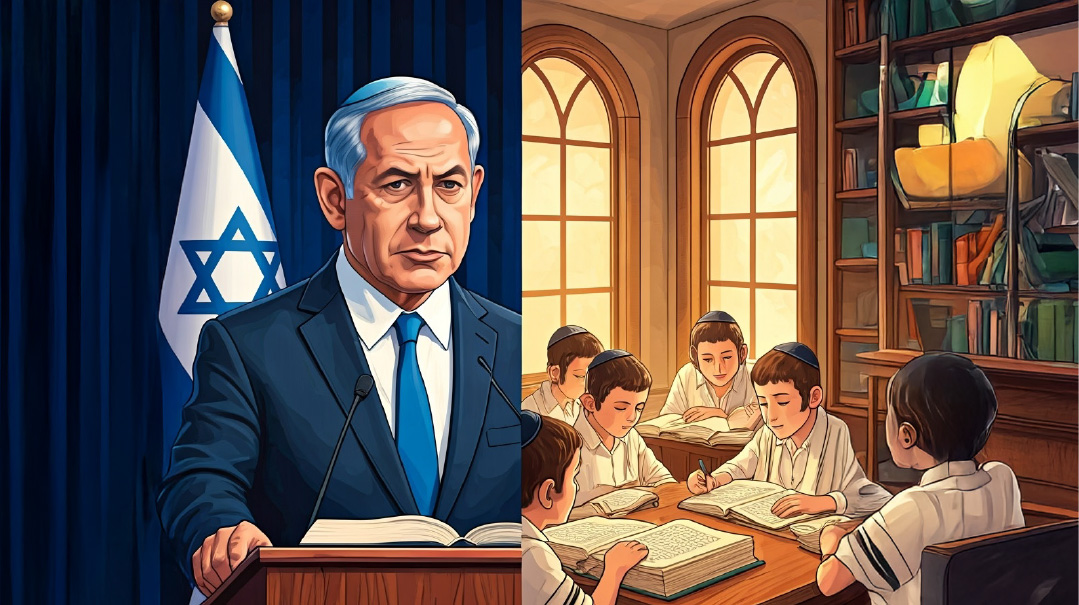Shabbos Hagadol, the Gateway to Geulah

Even poshute Yidden of previous generations sensed the momentousness of Shabbos Hagadol
A
number of years ago, a colorful and rather irreverent mispallel approached me after a Shabbos davening with the following question: After Mashiach comes, how will rabbanim end their derashos?
I thought for a moment and proceeded to quote the very last Rambam in Yad Hachazakah, which tells us that when Mashiach arrives, there will an endless desire for learning Torah. It must be, I told the mispallel, that when Mashiach comes, the rav’s derashos will never end!
Quips aside, our yearning for the Geulah permeates the entire Pesach season. The recitation of “Ha Lachma Anya,” right at the start of the Seder, concludes with the hope that this will be our last year of celebrating Pesach in galus. The very end of the Haggadah also concludes with L’shanah haba’ah b’Yerushalayim. Clearly there is more on our minds than the Pesach story itself.
And the yearning for Mashiach is in fact a theme of Shabbos Hagadol as well. In the yotzros that many congregations recite on Shabbos Hagadol, we find the piyut of Uv’chein vayehi bachatzi halailah, which concludes with a heartfelt plea for the coming of Mashiach, as well as the paragraph of Chasal Siddur Pesach, which ends on a similar note. What are we to make of this?
Even poshute Yidden of previous generations sensed the momentousness of Shabbos Hagadol. I recall an old time Hungarian baal habayis reprimanding a fellow mispallel for missing the rav’s Shabbos Hagadol derashah. With great emotion, he exclaimed, “Even if you don’t understand a word the rav is saying, on Shabbos Hagadol you come!”
What is it that this Yid sensed? What, in truth, is the depth of a Shabbos Hagadol derashah? What is the deeper reality that lurks beneath the surface?
If we’re being honest, my mispallel was right. The refrain, “we should be zocheh to bi’as haMashiach bimheirah b’yameinu,” has sadly become a standard nusach recited by rote when concluding a speech or conducting a conversation about the challenges of life. But do we really believe that the Mashiach can really come “speedily in our days,” or is it merely lip service to one of the Rambam’s thirteen ikrim of faith?
Interestingly, the SMaK (Sefer Hamitzvos Hakatan, authored by one of the Rishonim) maintains that the very first of the Aseres Hadibros, “Anochi Hashem... Who took you out of Mitzrayim,” includes a mandate to believe that we will be redeemed from this final galus as well (as quoted by Rav Chatzkel Levenstein ztz”l in Ohr Yechezkel — Emunah). Yet the reality and veracity of that rock-solid emunah is something we need to revisit in the deep recesses of our hearts and minds.
I recall the last conversation I had with the Lakewood Mashgiach, Rav Nosson Wachtfogel ztz”l, before departing for Chicago and the next stage of my life. Bear in mind, Rav Nosson wore his emunah in the coming of Mashiach on his sleeve. It was apparent in everything he did, including his legendary “Achakeh Lo” dance at weddings, a sight that everyone in attendance anticipated with tremendous excitement.
After I made my way to his office, the great maamin and tzaddik raised his heavy eyes and asked me if the moving truck had already arrived. Wanting to impress him and show off what I had supposedly absorbed being in his presence for the last 15 months, I responded, “Why should I order a truck to move us to Chicago? Mashiach can come right away!”
His jovial and holy countenance immediately became very serious as he stared at me and said in a tone that I will never forget, “Du gloibst dus — do you really believe that?”
I was exposed as the impostor he could tell I was. To me, it was a game. To him, it was the purpose of living.
Truthfully, I was in good company. In his Selected Speeches, Rav Shimon Schwab ztz”l shared that even he, as a young man, viewed the arrival of Mashiach as an event that would happen at the end of time, not as something that could be imminent. The advent of World War I changed that: His mother told him that people were anticipating Mashiach’s arrival, and suddenly it felt palpably real.
Sometime later, Rav Schwab visited the Chofetz Chaim. That encounter, which took place on Rosh Chodesh Nissan, was another moment when he felt how real Mashiach’s arrival could be: The great tzaddik told him that Mashiach’s arrival during Nissan was a “safeik hashakul,” a fifty-fifty chance.
The mitzvah of emunah requires a belief that there is a distinct possibility for Mashiach’s arrival to be an immediate reality. Yet, the Chofetz Chaim said, we only see it as a remote possibility and consider the odds no better than winning a lottery jackpot.
Rav Schwab goes on, taking us on a journey through other moments in his own lifetime when we had a feeling that “this is it,” only to have his hopes dashed repeatedly. In fact, Rav Elchonon Wasserman Hy”d told Rav Schwab back in his day that all the signs for Geulah were in place; all that was lacking was the prerequisite of teshuvah. The potential was always right on our doorstep; it was a matter of letting Mashiach in.
(At the same time, Rav Elchonon was very clear to emphasize that the Chofetz Chaim never said Mashiach would come soon, rather there was a definite chance. The Chevlei Mashiach are akin to a woman’s labor pains. We can’t know how long they will last. Therefore, if someone predicts a specific date for Mashiach’s arrival, he is a navi sheker.)
I can personally remember the “Mashiach fever” after the Gulf War of 1991 unexpectedly concluded on Purim. At that moment of joy and relief, so many of us felt that this might finally be it. For whatever reason, we were not zocheh.
Just over a year ago, toward the beginning of the Russian-Ukrainian war, there were reports that a Ukrainian nuclear power plant was on fire, and should it explode, there was real danger that entire part of the world would be wiped out. For the first time in my life, I actually felt that Rav Nosson’s excoriating mussar shmuess was bearing fruit, as I checked to see where my Shabbos frock was hanging in the closet. I wasn’t zocheh then either, but at least I finally knew what he meant and how the sense of anticipation might feel. For once, ich hub gegloibt.
According to the Maharal of Prague, this awareness and anticipation of bi’as HaMashiach is an essential component of Shabbos Hagadol. In Gevuros Hashem (Inyan Shabbos Hagadol, Divrei Negidim) the Maharal’s son-in-law suggests the following reason for the title of this Shabbos. At the end of the haftarah, we read the pasuk, “Hinei Anochi sholeiach lachem es Eliyah Hanavi, lifnei ba Yom Hashem hagadol v’hanora.”
In this pasuk we see that Yetzias Mitzrayim is called gadlus, greatness, because of all the incredible things that took place in conjunction with it, including gilui Shechinah, as we say in the Haggadah, “Uv’mora gadol — zu gilui Shechinah.”
We have been told by our prophets that at the time of the future Geulah, we will acquire even higher spiritual levels than those we achieved at Yetzias Mitzrayim.
We’ve been taught, as well, that all the events that transpire during the days of the week receive their spiritual energy from the previous Shabbos. That is when the spiritual gates are open to allow the forthcoming yeshuah to take place.
This, then, is why the Shabbos preceding Pesach is called Shabbos Hagadol — for this momentous Shabbos is when the floodgates swing open for our salvation, which is referred to as “yom hagadol v’hanora” in the pasuk quoted above.
It all begins on this Shabbos. And as the spiritual energies become more accessible, we do our own part to ignite them through our recitation of the Haggadah (for those who have that custom) and studying the Torah appropriate to the season (hence, the Shabbos Hagadol derashah).
What the Maharal is teaching us here (Divrei Negidim is based on his teachings as well) is that Shabbos Hagadol is an incredible opportunity to do our part in providing the spiritual charge for the long-awaited Geulah.
It follows, then, that the Shabbos Hagadol derashah is more than just a review of hilchos Pesach and perhaps even a pilpul on inyanei d’yoma. Similarly, the yotzros that many shuls recite in chazaras hashatz are not merely some timely poetry. They are an integral component of this Shabbos’s essence.
Shabbos Hagadol is a gateway to Geulah. It’s not only a commemoration of an event that occurred in the past, but an opportunity to tap into its brachah and segulah today. If we but utilize this opportunity, it can become our vehicle to bring Geulah. It’s a precious opportunity, and at the same time an awesome responsibility.
Could this realization, then, have sparked the poshute Hungarian Yid’s insistence on attending the Shabbos Hagadol derashah? Perhaps he possessed an inchoate recognition of the otherworldly power of Shabbos HaGadol and the approaching Yom Tov of Geulah to transcend time, and to forge our future by reexperiencing our past.
In Darchei Moshe, the compilation of anecdotes about Rav Moshe Feinstein ztz”l, we see how palpably Rav Moshe felt the season’s potential.
Rav Gershon Weiss ztz”l related that a particular talmid chacham accompanied Rav Moshe in the beginning of Iyar, and he heard a krechtz coming from the great gadol. After inquiring why, the answer Rav Moshe gave was simple: “Iyar has already arrived and Mashiach hasn’t come!” (Chazal famously taught that just as we were redeemed from Mitzrayim in Nissan, so too will the final redemption come in Nissan.)
On another occasion, as the final day of Nissan drew to a close, Rav Moshe commented that there was still a little bit of time left during which Mashiach was mesugal to come. To Rav Moshe it was reality. Ehr hut gegloibt, he truly believed.
This is why one Shabbos afternoon, as the hour was getting late, Rav Moshe purposely left his handkerchief out instead of putting it back in his pocket after using it. This was in accordance with the custom of not placing something in a pocket on Shabbos, lest one forget when he walks outside and transgress the melachah of carrying.
An attendee asked why he was concerned at this stage in his life about such dikdukei mitzvah when he was already infirm and there was no chance he would walk outside anyway. Incredibly, Rav Moshe looked at the man and reminded him that Mashiach could come at any moment, and Chazal taught us that upon his arrival, all cholim will be healed! If indeed Mashiach were to arrive, he did not want to have anything inside his pocket.
These are the distinctions that illustrate for whom bi’as haMashiach is only a refrain with which to conclude a derashah, or something for which we truly yearn as a result of our true and unwavering emunah of achakeh lo.
If we take the words of the Maharal to heart, we will approach Shabbos Hagadol with a new appreciation. As Rav Schwab put it so beautifully, just as there is a feeling of Erev Shabbos even before Shabbos actually begins, and certainly a feeling of Erev Pesach as Yom Tov is about to arrive, we should have a feeling of Erev Mashiach in the period preceding his arrival.
Are we ready? Maybe we should do something to make ourselves spiritually cleaner. It’s all a matter of how much we really mean it. Let us all be able to declare “Mir takeh gloiben!”
And as my friend would appreciate hearing for the last time, we should finally be zocheh to greet the Mashiach bimheirah b’yameinu, Amen.
(Originally featured in Mishpacha, Issue 955)
Oops! We could not locate your form.






